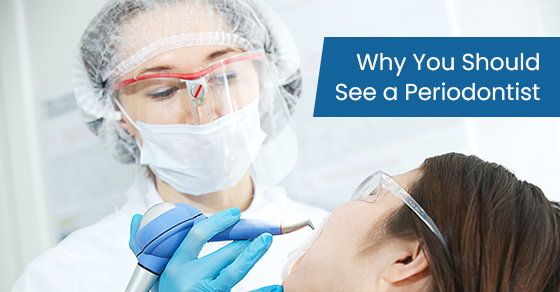There are several aspects to oral health. You know that you should brush your teeth twice daily to remove food debris and that flossing helps prevent cavities. As well, you likely spend a lot of time thinking about the health of your teeth. Still, how often do you consider your gum health?
It’s impossible to have healthy teeth without healthy gums. Your gums are responsible for holding your teeth in place, allowing you to eat, smile, and talk normally. When gums become inflamed or infected, it’s incredibly painful, and it can lead to tooth loss.
If you have a problem with your gums, you will need to see a periodontist. General dentists care for your overall oral health; periodontists focus on the health of your gums.
What is a periodontist?
Periodontists focus on the prevention, diagnosis, and treatment of conditions and diseases that affect your gums. This includes everything from gum disease to oral inflammation.
Although periodontists undergo the same training as general dentists, they must also complete additional years of specialized study. These extra years prepare periodontists with the knowledge and training to address a wide variety of gum-related issues.
As a result, your general dentist may refer you to a periodontist if you have signs of gingivitis or periodontitis.
What can a periodontist do?
Since periodontists have the same training as general dentists, they can perform the same treatments. However, periodontists also provide specialized services to repair the tooth’s supporting gum tissues. Some of these treatments are nonsurgical, while others involve surgery.
Nonsurgical Treatments:
- Scaling and root planing
- Laser treatment
Surgical Treatments:
- Dental implants
- Dental crown lengthening
- Regenerative procedures
- Periodontal pocket reduction procedures
- Gum graft surgery
4 Benefits of Visiting a Periodontist
1. Prevent unnecessary tooth loss
No one wants to lose a tooth. Unfortunately, a serious infection in your gums can make tooth loss a real possibility. The sooner you see your periodontist at Bristol Dental Clinic in Mississauga, the higher the likelihood of saving your tooth.
Periodontists have an arsenal of treatment options at their disposal to prevent unnecessary tooth loss. Your periodontist will recommend the best treatment based on the severity of your case. For example, you might need root surface debridement to remove the damaged tissue or gum grafting to restore healthy gum tissue.
2. Address advanced cases of gum disease
Periodontal disease is a severe infection of the gum tissue, which weakens the bones and fibres that keep your teeth in place. It begins as gingivitis and can be reversed if detected in these early stages.
Once it advances to periodontitis or advanced periodontitis, it is much harder to treat. If you have advanced gum disease, you will be referred to a periodontist.
Your periodontist has the training and knowledge to handle complex gum disease cases. At Bristol Dental Clinic, we’ll design a treatment plan that restores your gum health.
3. Replacement of missing teeth
A variety of unfortunate scenarios can lead to tooth loss. For example, periodontal disease, sporting injuries, and car accidents are just a few such events. Regardless of how it happened, the most important thing is restoring the function and appearance of your mouth.
All periodontists have a thorough understanding of the gums, jaw bone, and tooth structure. Consequently, a periodontist can perform dental implant surgery to replace your missing tooth. If you lost a tooth due to gum disease, it’s crucial to have the expertise of a periodontist. After all, it’s necessary to remove the infection in its entirety.
4. Specialized dental treatments
Periodontists are trained in dedicated dental treatments related to combating infection in the gums and restoring gum health, thus eliminating your discomfort and potentially saving you from tooth loss. Here are a few examples:
- Gum grafting: involves taking healthy gum tissue and grafting it over areas that have sustained damage. This can reduce the appearance of long teeth caused by gum disease.
- Regenerative procedures: encourage new bone and tissue growth. Periodontists do this by folding gum tissue back to close periodontal pockets and eliminate bacteria.
- Laser treatment: removes gum tissue that has become infected due to periodontal disease.
- Dental crown lengthening: removes excess gum tissue. This is often done prior to inserting a new dental crown. However, it is also a cosmetic procedure performed to improve the aesthetics of your smile.
When should you see a periodontist?
During your regular check-ups, your general dentist examines the health of your teeth and gums. They look for signs of gingivitis, inflammation, and infection. Although general dentists can treat some gum problems, you will be referred to a periodontist if your condition is deemed complicated.
It’s important to familiarise yourself with the early signs of gum disease. After all, pain is often one of the last symptoms of serious oral health conditions. By understanding the warning signs, you can start treatment faster
.
If you notice any of these common gum disease signs and symptoms, make an appointment with your dentist at Bristol Dental Clinic:
- Swollen or puffy gums: Inflammation is one of the first signs of gingivitis, which worsens into gum disease if untreated.
- Gums that bleed easily: Inflamed gums are often extremely sensitive. They become tender to touch and bleed easily when you eat, floss, or brush.
- Bad breath: Gingivitis and gum disease can cause stubborn bad breath. If your bad breath refuses to go away, your gums may be infected.
- Receding gum lines: Gum disease, grinding your teeth, and brushing too hard can all cause gum lines to recede. There are cosmetic procedures that can correct this issue. If your receding gums are caused by periodontitis, your periodontist can recommend a treatment course.
- Painful chewing: Gum inflammation and gum disease can loosen teeth, making it painful to chew.
Bristol Dental Clinic: Mississauga’s Top Periodontists
Periodontists play an invaluable role in your oral health. Their expertise and knowledge enable them to handle a wide range of gum conditions and diseases. That’s why you may be referred to a periodontist if your dentist detects signs of inflammation or infection in your gums.
At Bristol Dental Clinic, we have a team of highly qualified and experienced periodontists ready to help. We specialize in preventing, diagnosing, and treating gum disease and other conditions. Contact us today if you are looking for periodontal treatment in Mississauga!
To find a periodontist in Mississauga, call Bristol Dental Clinic at 866-673-2109 or contact us here.






[…] You should see a periodontist if you have gingivitis, gum disease, or oral inflammation. Periodontists provide specialized dental treatments to combat gum infections and restore gum health. […]